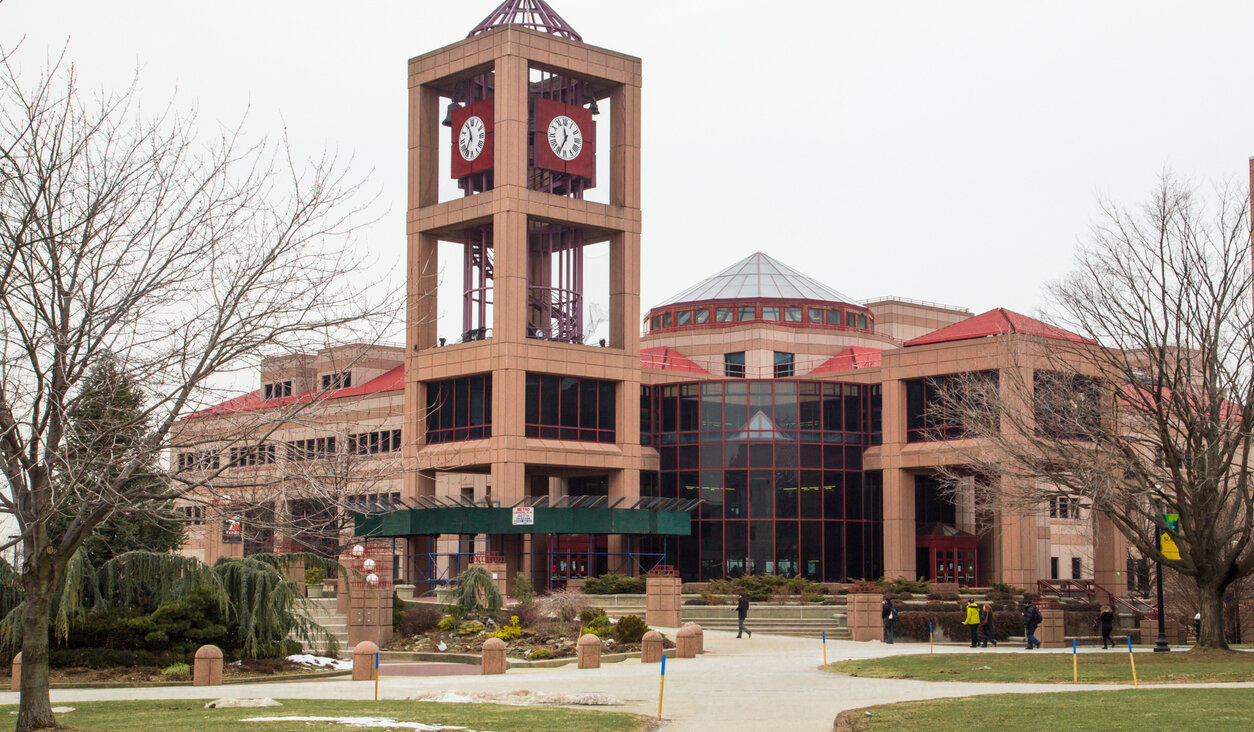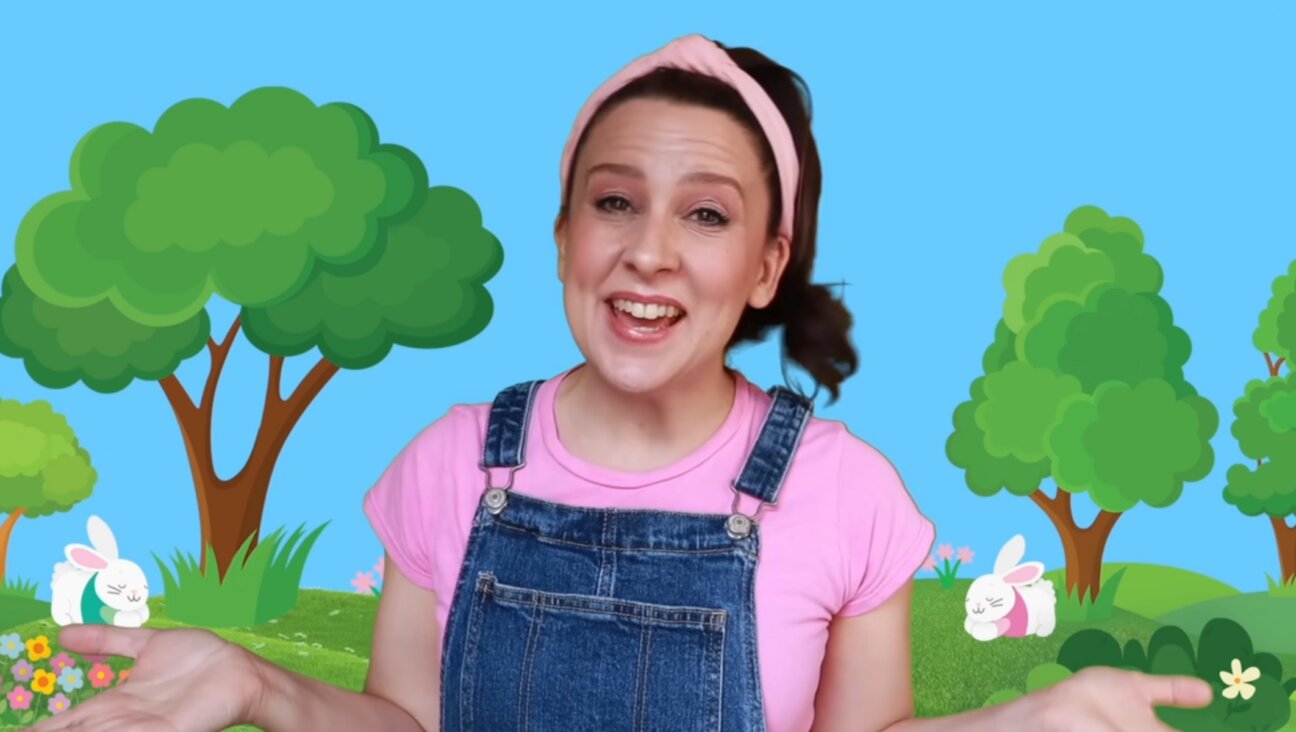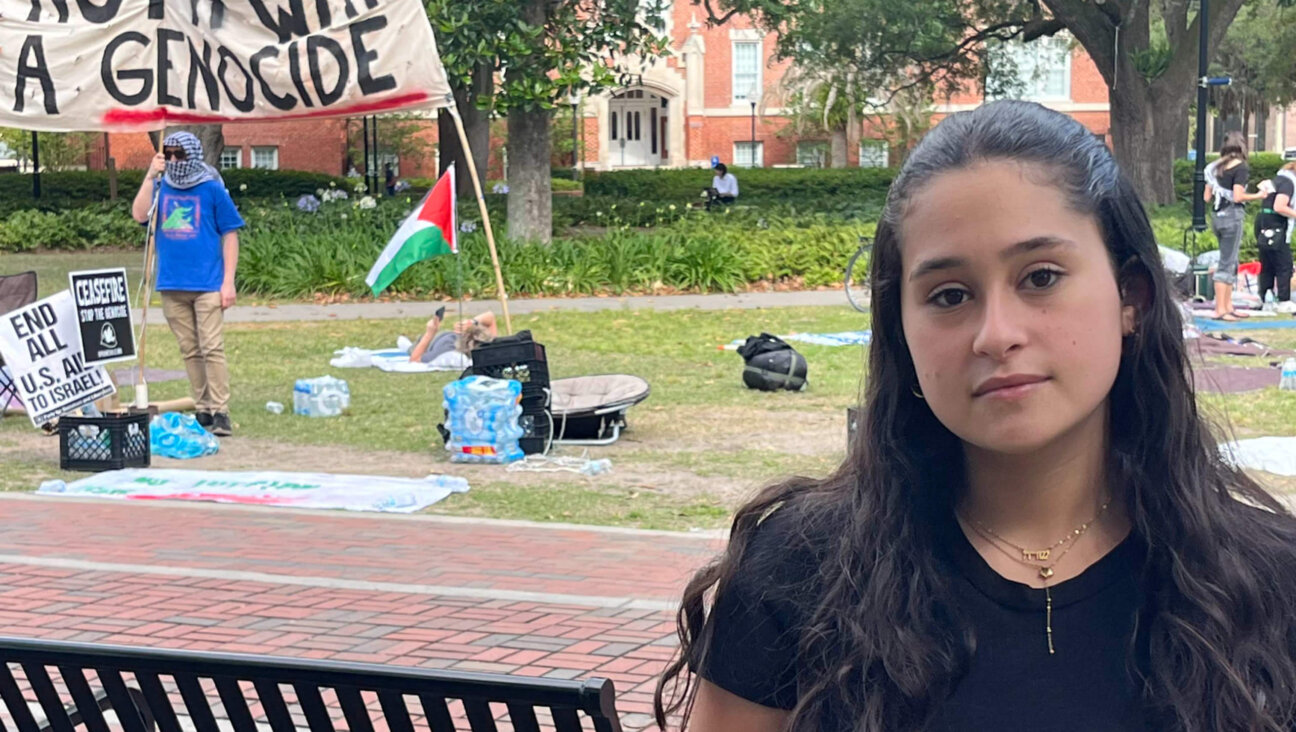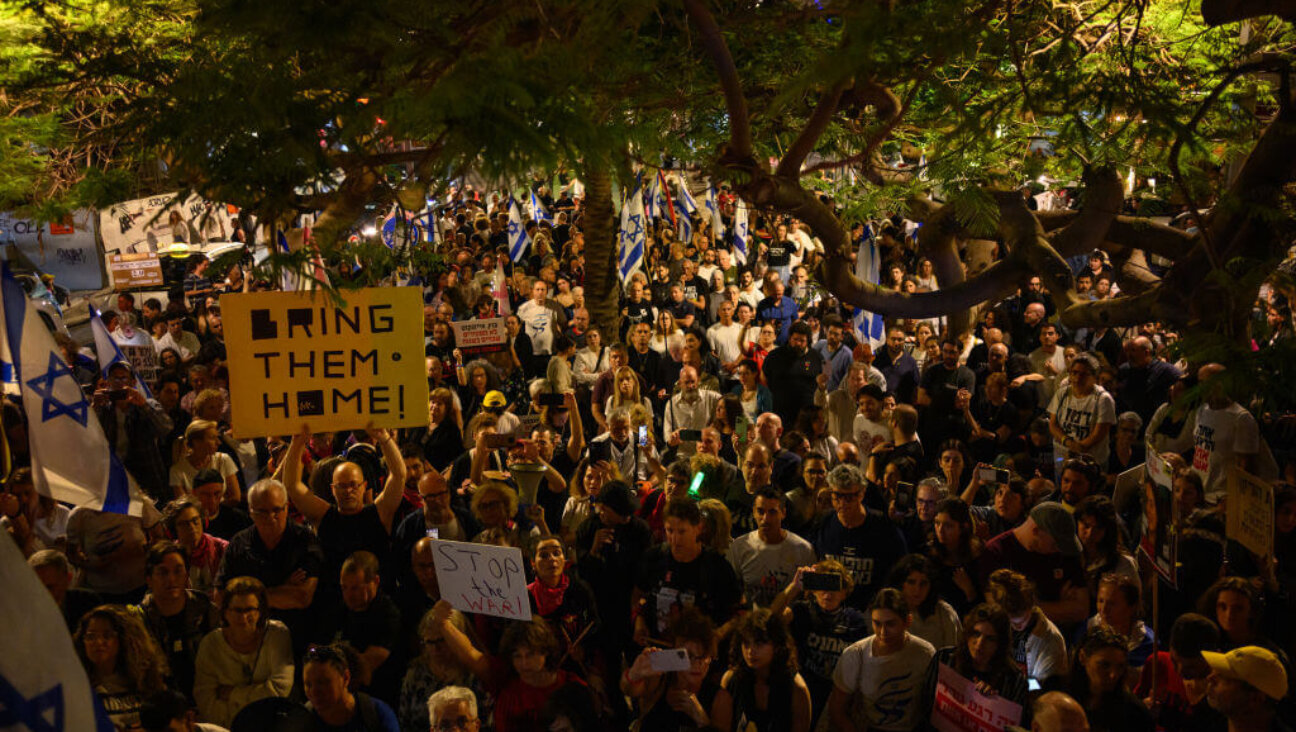The federal government is now funding Holocaust education, but does it actually work?

Ellicott High school students read informational poster boards in the “Holocaust museum” exhibit during Holocaust Remembrance Day at Schriever Air Force Base, Colorado, Tuesday, Aug. 23, 2016. Image by Airman William Tracy/U.S. Air Force
With the passage and signing of the Never Again Education Act, the federal government is funding Holocaust education for the first time.
As asserted in the very name of the law, the politicians and Jewish organizations who supported the bill and hailed its recent signing by President Trump say education can actually help prevent violent hatred.
“The best way to prevent an atrocity like the Holocaust from occurring again is through education,” stated Sen. Jacky Rosen of Nevada, a former synagogue president who, along with Rep. Carolyn Maloney of New York, sponsored the legislation.
Holocaust education has become increasingly widespread since 1985, when California became the first state to mandate it. After a wave of new state laws in the past few years, it’s now a mandatory feature of public schools in more than a dozen states, including each of the six largest by population.
The new law, signed May 29 and passed by overwhelming bipartisan majorities in both chambers of Congress, does not include a Holocaust education requirement like those states do. Instead, it provides $10 million over five years to the United States Holocaust Memorial Museum in Washington, D.C. to develop and disseminate curriculum materials for middle and high school teachers who are already teaching it, or want to.
Those states that do require Holocaust education usually offer two reasons why: It’s an important event in world history, and learning about one of humanity’s darkest moments will help students recognize signs of prejudice and inspire them to speak out against it.
Yet after more than thirty years, experts and practitioners disagree over whether students who take Holocaust classes become any more ethical than students who don’t — or even if they retain the information after the class is over.
Many signs aren’t promising: Pew found in January that less than half of Americans know that 6 million Jews were killed; in 2018, two-thirds of Millennials told a pollster commissioned by a Holocaust survivor advocacy group that they didn’t know what Auschwitz was.
The data that would make the case for Holocaust education just isn’t there, said Jonathan Krasner, a professor of Jewish education research at Brandeis University.
“Nobody has done any kind of comprehensive study about the effectiveness of Holocaust education writ large,” he said.
Fighting “Holocaust fatigue”
Two of the largest not-for-profits that provide Holocaust education materials and training to teachers also supported the Never Again Education Act: Echoes & Reflections – a partnership of the Anti-Defamation League, the USC Shoah Foundation and Israel’s Yad Vashem museum – and the Massachusetts-based Facing History and Ourselves.
Both Echoes & Reflections and Facing History and Ourselves have sections of their website replete with studies that show that participants see improved empathy and civic-mindedness, but Krasner – who stressed that he admired both organizations – said that those were less convincing than those commissioned by outside groups or researchers.
“They’re not necessarily going to share things that don’t reflect well on them,” he said.
Effective research, in which independent scholars measure what students think before and after taking lessons, “is pricey, it’s time and labor intensive, and it ought to be both quantitative and qualitative,” said Simone Schweber, a professor of education and Jewish studies at the University of Wisconsin-Madison. “There aren’t a lot of those studies generally.”
Many studies that do exist paint a grim picture. Holocaust education has been part of Britain’s national curriculum since 1991, but a 2015 study found that most teens’ knowledge of the Holocaust came from pop culture and not from schools.
“I didn’t stop being racist because of learning about the Holocaust … I’ve always not been racist,” said one student interviewed.
One paper from the University of Arkansas did find that middle schoolers who went to a Holocaust education conference were more likely to self-report after the event that they would be “upstanders” in the face of injustice. But the change was significant only among minorities, not whites.
What’s more, educators do know, despite the patchy research, that students’ experiences with Holocaust education can vary widely.
What sometimes happens, said Schweber, who has written two books on the subject, is “Holocaust fatigue” – students zoning out because they have watched the same documentaries in multiple classes, or re-learned similar lessons every year from kindergarten through their senior year of high school. Other times, teachers assign books like Elie Wiesel’s “Night,” an account of his time in a concentration camp, before students are mature enough to internalize its messages.
The quality of the teaching can be “radically different” even from classroom to classroom within the same school, let alone different states, she said.
But the Holocaust education organizations say that those inconsistencies provide even more reason to support the education grants created by the law.
“Just because there’s a mandate that requires something to be taught, it doesn’t mean teachers are doing it in a productive way,” said Echoes & Reflections director Ariel Behrman.
“We know that when you teach high-quality science, students become better scientists. If you teach science that’s not up to snuff, students don’t,” agreed Facing History CEO Roger Brooks. “It’s the same with history.”
Connecting the Holocaust to today
Mistakes like “Holocaust fatigue” are what the educational organizations are there to prevent. Facing History and Ourselves says it’s worked with 100,000 teachers since since the mid-1970s, while Echoes & Reflections says it’s trained 70,000 teachers in the past 15 years.
The big national studies that show widespread ignorance of the Holocaust are likewise reasons to do more, not less, Behrman said. Even though Holocaust education is becoming more common, it’s still the case that most Americans didn’t grow up in a time or place when it was mandatory. Polls will be better in coming years, she said.
Other scholars interviewed said that Americans are bad at history in general, and that isn’t a verdict on Holocaust education specifically.
One way Facing History and Ourselves and Echoes & Reflections try to make the lessons stick is by emphasizing how the Holocaust is relevant to students’ lives, said Behrman. “We make connections to contemporary anti-Semitism, to the refugee experience in the Holocaust and the refugee experiences today.”
But those connections can create more complications.
Last year, for example, Rep. Alexandria Ocasio-Cortez – a product of public schools in New York, where Holocaust education has been mandatory since she was five years old – compared refugee detention centers on the Mexican border with Nazi concentration camps.
For this, she was condemned by the ADL and Yad Vashem.
Both of those organizations sponsor Echoes & Reflections, which encourages students to make connections to contemporary refugee issues, said its leader, Behrman.
The seeming contradictions reflect a larger debate among Jewish leaders over whether Holocaust classes should emphasize the dangers of prejudice in general, or highlight anti-Semitism and the particularly Jewish nature of the tragedy.
It’s inevitable that teachers at schools with small or non-existent Jewish populations will encourage students to focus on the universal lessons, to make it applicable to their lives, Krasner argued.
But that means that as more students who took Holocaust classes grow up and enter positions of leadership, they may be more willing to make Holocaust analogies that Jewish leaders may not like.
Whether this means Holocaust education has been successful or not will depend on who is answering the question, and when.
But even skeptics say that as long as Holocaust education is required by states, teachers should be given easy access to the best materials available.
“Here we are 75 years after the end of the war: We’re living in the period where the last living eyewitnesses won’t be around much longer, and Holocaust denial is resurgent because conspiracy theories can go viral on the internet and go unchecked,” said Avinoam Patt, a Jewish studies professor at the University of Connecticut and a former resident scholar at the United States Holocaust Memorial Museum. “That’s all the more reason to have these programs.”
Aiden Pink is the deputy news editor of the Forward. Contact him at [email protected] or follow him on Twitter @aidenpink
The Forward is free to read, but it isn’t free to produce

I hope you appreciated this article. Before you go, I’d like to ask you to please support the Forward.
Now more than ever, American Jews need independent news they can trust, with reporting driven by truth, not ideology. We serve you, not any ideological agenda.
At a time when other newsrooms are closing or cutting back, the Forward has removed its paywall and invested additional resources to report on the ground from Israel and around the U.S. on the impact of the war, rising antisemitism and polarized discourse.
This is a great time to support independent Jewish journalism you rely on. Make a gift today!
— Rachel Fishman Feddersen, Publisher and CEO
Support our mission to tell the Jewish story fully and fairly.
Most Popular
- 1

Culture Cardinals are Catholic, not Jewish — so why do they all wear yarmulkes?
- 2

Fast Forward Ye debuts ‘Heil Hitler’ music video that includes a sample of a Hitler speech
- 3

News School Israel trip turns ‘terrifying’ for LA students attacked by Israeli teens
- 4

Fast Forward Student suspended for ‘F— the Jews’ video defends himself on antisemitic podcast
In Case You Missed It
-

Yiddish קאָנצערט לכּבֿוד דעם ייִדישן שרײַבער און רעדאַקטאָר באָריס סאַנדלערConcert honoring Yiddish writer and editor Boris Sandler
דער בעל־שׂימחה האָט יאָרן לאַנג געדינט ווי דער רעדאַקטאָר פֿונעם ייִדישן פֿאָרווערטס.
-

Fast Forward Trump’s new pick for surgeon general blames the Nazis for pesticides on our food
-

Fast Forward Jewish feud over Trump escalates with open letter in The New York Times
-

Fast Forward First American pope, Leo XIV, studied under a leader in Jewish-Catholic relations
-
Shop the Forward Store
100% of profits support our journalism
Republish This Story
Please read before republishing
We’re happy to make this story available to republish for free, unless it originated with JTA, Haaretz or another publication (as indicated on the article) and as long as you follow our guidelines.
You must comply with the following:
- Credit the Forward
- Retain our pixel
- Preserve our canonical link in Google search
- Add a noindex tag in Google search
See our full guidelines for more information, and this guide for detail about canonical URLs.
To republish, copy the HTML by clicking on the yellow button to the right; it includes our tracking pixel, all paragraph styles and hyperlinks, the author byline and credit to the Forward. It does not include images; to avoid copyright violations, you must add them manually, following our guidelines. Please email us at [email protected], subject line “republish,” with any questions or to let us know what stories you’re picking up.
















